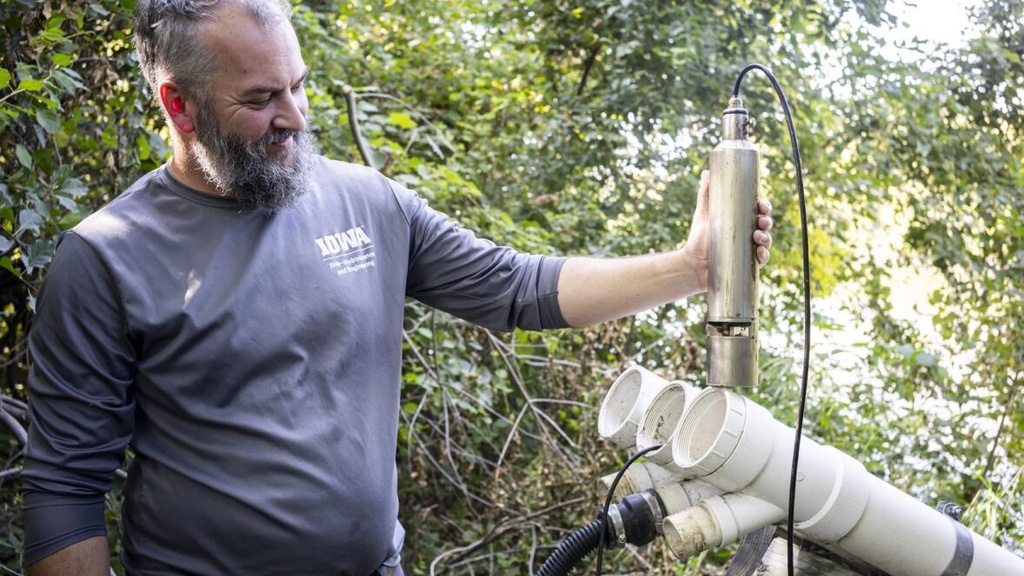Articles from November 2025

Johnson County weights $200,000 request to keep Iowa water sensor network running
Wednesday, November 19, 2025
The UI-run network, once funded by the state, now relying on counties and donations to avoid closure

Funding bill includes $16 million for earmarked
Wednesday, November 19, 2025
The bill President Donald Trump signed on November 12 to end the longest federal government shutdown includes $16 million for designated projects in Iowa, according to Bleeding Heartland’s analysis of a Senate Appropriations Committee report.

'Water Quality is Degrading, There Is No Question About That:' University of Iowa Researcher Warns
Thursday, November 13, 2025
The Winneshiek County Board of Supervisors on Monday heard from Larry Weber, director of civil and environmental engineering at the University of Iowa regarding the future of Iowa’s statewide water quality monitoring network, which faces uncertainty following state funding cuts.

University of Iowa geophysicist uses new tech to survey Iowa levees
Wednesday, November 12, 2025
Jason Vogelgesang, a geophysicist with the Iowa Geological Survey, talks on Oct. 29, 2025, about a statewide scanning process the University of Iowa group is doing for the state legislature and levee districts. By using electricity pulses, IGS can detect anomalies — possibly leaky spots — in Iowa's levees. The novel way IGS has rigged their equipment drastically improves efficiency.

IIHR program manager Kate Giannini receives Fulbright award for a research exchange in the Netherlands
Monday, November 10, 2025
Kate Giannini, program manager at IIHR—Hydroscience and Engineering, has been awarded a Fulbright and will be hosted by Deltares located in Delft, Netherlands for a six-week exchange beginning at the end of December 2025.

Levee survey a proactive step to protecting Iowa communities
Monday, November 10, 2025
The Iowa Geological Survey is undertaking a comprehensive five-year project to survey and assess Iowa's 900 miles of levees using cutting-edge geophysical technology, an important precautionary measure to ensure flood protection is ready for the next natural disaster.

Faculty Spotlight: Cong Wang
Thursday, November 6, 2025
If you ask Cong Wang where home is, you’ll get a complicated answer. Born in northern China, he went to Singapore as an undergraduate, where he earned a BEng degree in engineering science. He came to the United States and the California Institute of Technology for graduate school and earned MS and PhD degrees in aeronautics. He stayed on at Caltech for a postdoc and then as a research scientist — 10 years in all.

Iowa Counties Keep Water Quality Monitoring Afloat After State Funding Cuts
Wednesday, November 5, 2025
For over a decade, a network of water quality sensors managed by the University of Iowa has provided publicly available data about waterways across the state.
And while Iowa grapples with a growing water quality crisis fueled by agricultural runoff, state government funding cuts have threatened the network’s future.

Scientists Say Polk County's water research findings are applicable to Eastern Iowa, too
Monday, November 3, 2025
Despite continued contamination and nitrate spikes in Iowa’s rivers and streams this year, University of Iowa researcher Elliot Anderson insists that the state’s water quality issues can be solved.
An effort to save Iowa's water quality tracking system
Monday, November 3, 2025
This summer Des Moines residents couldn't water their lawns — not because of drought, but due to nitrate pollution. Now, the very system that monitors Iowa's water quality faces a shutdown. Host Ben Kieffer speaks with director of IIHR Hydroscience and Engineering Larry Weber about the implications if we no longer track water quality and the effort to fund the network of 60 sensors across the state.
Pagination